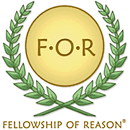
|
|
|
Choosing between Truth-Finding Methods by
Matthew Arnold (02/01/2003)
When I decline to accept faith as valid, I am often challenged by faith users to define what I mean when I refer to legitimacy or validity of a truth-finding method.
In this context the definition is "the cause-and-effect relationship between reality and the truth-finding-method in question." Reality causes reason to succeed in a way that does not exist with any other method, for instance, coin-tossing. (Keep in mind in this post when I say "faith" "reason" and "coin-tossing" I am not referring to a set of conclusions, but a method of reaching them.)
Deciding the truth or falsity of a claim, one way you could go about it is to toss a coin. You would get an answer. Are we then to say that the mental toolbox has "reason" "faith" and "coin tossing" as three equally valid modes? How would you judge the reliability of the coin-tossing mode of truth-finding? By tossing the coin again? Or by using reason?
Now let's compare this to faith defined as trust in authority. There's no cause-and-effect relationship there. To say that truth becomes true just because somebody says it is, is equivalent to saying there is no reality external to consciousness. If reality is dependent on consciousness and changes to be whatever someone wants it to be, why would that not be you rather than someone else? This puts an end to the whole truth-finding process.
Let's compare coin-tossing to faith defined as a firm inner conviction. Ask a practitioner of this method to defend the reliability of it. What does he use? He usually switches to using reason-mode, which is to concede reason's legitimacy. Otherwise it does nothing to help. If it is legitimate and it is the premise on which firm-inner-conviction-mode is grounded, then reason-mode is primary. To predicate faith on reason and then use it to overturn the verdict of reason would make reason invalid, and contradict your own premise. Then reason wins in any dispute with a firm inner conviction, making it unnecessary. When someone attempts to defend faith-mode using reason-mode, they are conceding that reason is the whole toolbox (a phrase borrowed from Atheism: The Case Against God by George H. Smith).
Instead one could defend one of these faith-modes by using a firm inner conviction again, or the word of authority again. How does that establish a cause-and-effect relationship with reality any different from "proving" coin-tossing by tossing a coin again? It is the same as not defending it at all. Therefore we are not faced with a choice between different tools in the mental toolbox. We are faced with a choice between using the toolbox or abandoning it.
A more sophisticated definition of faith is trust in credibility established by reason. This is to say that there is such a thing as reality but it is just as good to let somebody else find it out and tell you. I don't argue that that is totally without value. But notice that this is not an alternative mode to reason, it is identical. To say that it is reasonable is to say that it is a subsidiary of reason-mode. Again, if it overturns the verdicts of the very method it is predicated on, it is self-defeating. If it is always accountable to reason-mode and never overturns its verdict, it is superfluous and serves no function but to sit there saying "yes" to reason.
It is misleading to refer to this with the word "faith." The resulting conceptual muddle blurs the distinctions between these faith-modes, giving people the illusion that they have heard a justification of the others. Someone is probably thinking at this point that using reason to establish reason is just like establishing coin-tossing by tossing a coin again. But if reason is alone in the toolbox, the only alternative is to abandon the truth-finding process. I know of no person who will decide to completely abandon the use of reason. It is possible to attempt to abandon the use of coin-tossing, firm inner convictions and relativistic authoritarianism in the truth-finding process. This can be carried through completely, at least in principle if not in practice. You can't abandon the use of reason completely even if you tried. Someone who tried to do so would use reason to identify reason so it could be avoided. Otherwise they would be helpless to avoid it.
In the same way, if you believe reason is a valid approach but no more valid than other "modes," what mode would you use to identify when to use which mode? To use something other than reason to do this simply means to abandon criteria for deciding when to use which "mode." Reason is the only method that you have no choice but to use to choose between methods. What is the definition of reason but "the application of criteria"? "Discrimination" "discernment" or "criteria" can be misleadingly applied within other so-called methods, but these words have no content without the concept of reason.
Matthew Arnold is a desktop publisher. He moderates The Electric Monk, a discussion board and weblog on worldviews. Matt lives north of Detroit, Michigan. His personal website is http://www.geocities.com/nemorathwald/.
Respond to this Commentary. |

